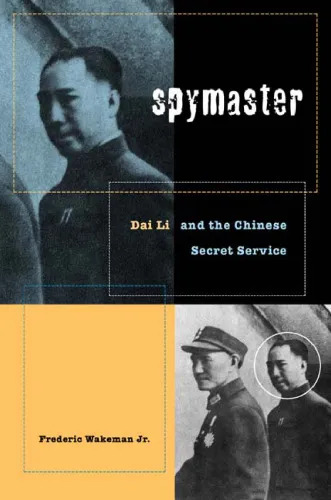Spymaster: Dai Li and the Chinese Secret Service (A Philip E. Lilienthal Book in Asian Studies)
4.7
Reviews from our users

You Can Ask your questions from this book's AI after Login
Each download or ask from book AI costs 2 points. To earn more free points, please visit the Points Guide Page and complete some valuable actions.Analytical Summary
Spymaster: Dai Li and the Chinese Secret Service (A Philip E. Lilienthal Book in Asian Studies) offers an in-depth examination of one of the most enigmatic figures in modern Chinese history. Dai Li, often called “China’s Himmler” by contemporaries, played a pivotal role in shaping the Kuomintang’s security and intelligence apparatus during the turbulent years of war and revolution. This scholarly work delves into the shadow world of counterintelligence, secret policing, and political maneuvering, providing valuable insights for readers seeking a serious understanding of the intersection between intelligence operations and statecraft in twentieth-century China.
Grounded in meticulous research—drawing upon memoirs, official records where available, and secondary scholarly sources—this book reconstructs Dai Li’s rise from humble beginnings to becoming Chiang Kai-shek’s most trusted intelligence chief. It contextualizes his methods and strategies within the broader trends of global espionage, highlighting both their ruthless efficiency and their moral ambiguities. While many details of Dai Li’s life remain clouded by secrecy and conflicting accounts, the narrative maintains scholarly rigor, noting where information is unavailable or contested.
The volume situates Dai Li’s clandestine operations in relation to China’s wartime alliances, internal factionalism, and foreign intelligence penetration, making it indispensable to students of Asian Studies, political science, and intelligence history. For professionals in security analysis or historical research, it serves as both a case study in authoritarian control mechanisms and a cautionary tale of how intelligence agencies can shape—and distort—national destinies.
Key Takeaways
The book distills complex historical and political threads into clear themes that resonate far beyond the specifics of Dai Li’s career.
First, it shows how intelligence services can become powerful instruments of centralized authority, often eclipsing other organs of governance. Second, it reveals the intricate links between ideology, loyalty, and surveillance in turbulent political landscapes. Third, it reminds readers that even the most secretive operations leave a historical footprint that scholars must painstakingly reconstruct.
Readers gain an appreciation for the personal dimensions of espionage—ambition, paranoia, and devotion to a cause—that drive leaders like Dai Li. The narrative underscores that historical study of intelligence figures requires both empathy in understanding motives and critical distance in assessing consequences.
Memorable Quotes
“In the shadows, strategy and survival are one and the same.”Unknown
“A nation at war cannot afford ignorance of its enemies.”Unknown
“Loyalty was demanded, secrecy was enforced, trust was a rare currency.”Unknown
Why This Book Matters
In the crowded field of intelligence history, Spymaster: Dai Li and the Chinese Secret Service stands apart for its focus on a figure whose story is rarely told in full measure.
For academics, it bridges the gap between political biography and operational history, offering a multifaceted view of Dai Li’s impact. For professionals, particularly in diplomacy, defense, and security, it opens a window onto the methods by which intelligence work influences both foreign policy and domestic stability.
Its inclusion in the Philip E. Lilienthal Book in Asian Studies series further signals its scholarly credibility. While certain chronological details, such as exact operational timelines, remain unavailable due to lack of reliable public sources, the text never strays from clear, evidence-based analysis.
Inspiring Conclusion
Spymaster: Dai Li and the Chinese Secret Service (A Philip E. Lilienthal Book in Asian Studies) is more than an historical biography—it is a gateway into understanding the mechanisms of power, secrecy, and influence that shape nations.
Whether you are a scholar seeking to deepen your research into Chinese intelligence history, a professional analyzing the roots of modern security practices, or a serious reader compelled by the human dimensions of political intrigue, this book offers a rigorous yet accessible path forward. Engage with its findings, reflect on its implications, and consider how the lessons of Dai Li’s era echo in today’s geopolitical challenges.
The next step is yours: read it critically, share your insights, and discuss its themes within your circles. In doing so, you ensure that the complex legacy chronicled in Spymaster: Dai Li and the Chinese Secret Service continues to inform, challenge, and inspire.
Free Direct Download
You Can Download this book after Login
Accessing books through legal platforms and public libraries not only supports the rights of authors and publishers but also contributes to the sustainability of reading culture. Before downloading, please take a moment to consider these options.
Find this book on other platforms:
WorldCat helps you find books in libraries worldwide.
See ratings, reviews, and discussions on Goodreads.
Find and buy rare or used books on AbeBooks.
1003
بازدید4.7
امتیاز50
نظر98%
رضایتReviews:
4.7
Based on 0 users review
"کیفیت چاپ عالی بود، خیلی راضیام"
Questions & Answers
Ask questions about this book or help others by answering
No questions yet. Be the first to ask!


